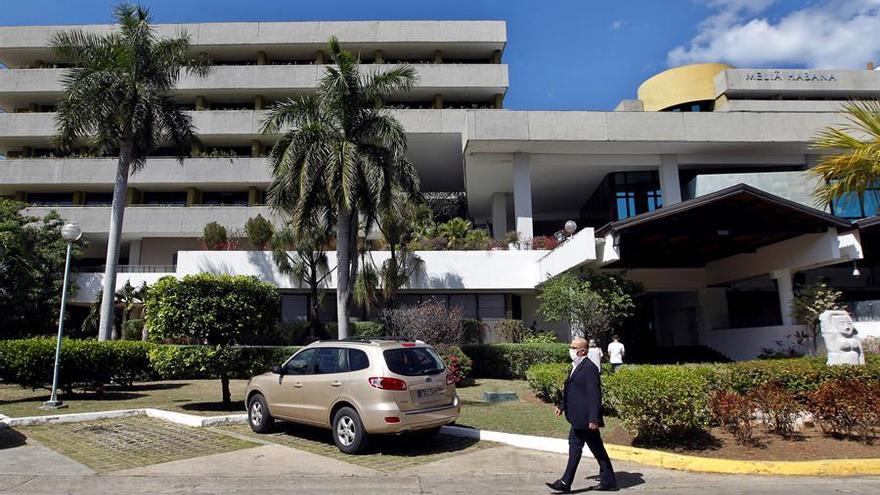
![]() EFE/14ymedio, Havana, 13 February 2021 — Enjoying five nights and six days in a hotel in Cuba is now more than ever within the reach of any international traveler, with packages ranging from 250 to 600 dollars. With one problem: the guest cannot leave the room.
EFE/14ymedio, Havana, 13 February 2021 — Enjoying five nights and six days in a hotel in Cuba is now more than ever within the reach of any international traveler, with packages ranging from 250 to 600 dollars. With one problem: the guest cannot leave the room.
These “confinement packages” include airport transfers and accommodation with full board in establishments of between three and five stars, in addition to medical attention and the number of PCR tests necessary so that the client can be released on the sixth day if the Covid-19 infection is ruled out. It is the island’s response to the collapse of tourism due to the pandemic.
Since the middle of last January, the island has suffered a harsh second wave of infections: it has not dropped below 500 daily positives and on some days it has touched a thousand.
Six hotels in Havana (Vedado, Parque Central, Capri, Tulipán, Meliá Habana and Comodoro), one in Varadero (Starfish Las Palmas) and six more in other provinces (Granjita and Los Caneyes in Santa Clara, Sol Cayo Coco in Ciego de Ávila, Plaza in Camagüey, Mirador de Mayabe in Holguín and Versalles in Santiago de Cuba) have hosted clients of various nationalities who have contracted this offer since last weekend.
To contain contagions, which in this second wave were attributed mainly to travelers from abroad, everyone who arrives in the country is obliged to undergo isolation until they have had rwo negative PCR tests at least five days apart.
There are two isolation options: the free one, which is to spend at least a week in state institutions in places such as campsites and student residences, and the paid one, with one of the new packages that can be purchased online at the traveler’s origin or directly at airport arrivals.
There are two isolation options: the free one, which is to spend at least a week in state institutions in places such as campsites and student residences, and the paid one, with one of the new packages that can be purchased online at origin or directly in the room of airport arrivals.
Cubans and residents on the island can choose between both options, but foreigners who arrive as tourists or for other purposes do not have the option of going to a state center and must spend the isolation period in a hotel.
“We are promoting it through social the networks so that the client comes with the purchased package,” declared the marketing director of the state agency Havanatur, Isabel Docampo, in a meeting with Efe and other international media in Havana to explain the new initiative.
So far, most of the hundreds of travelers who have purchased one of the “confinement packages” are Cubans residing in other countries, mainly in the United States, who return to visit their relatives, according to Docampo.
There are also Cubans who return from personal or work trips, as is the case of Madeline Hernández, who this week arrived from the Dominican Republic with her family and is staying at the four-star Comodoro hotel in Havana.
“I travel for work and my company pays for the package for us, so we don’t have to go to an isolation center, where the conditions are different,” this 49-year-old woman, who works for a foreign company , explains from the balcony of her bungalow in the Cuban capital.
Although Cubans currently occupy the vast majority of hotel rooms reserved for travelers in isolation, in Havanatur they believe that their offers could also be attractive to European, Asian or American tourists who want to escape the cold and the harsh restrictions imposed in their respective countries.
“The tourist who arrives and buys the package spends those five nights and six days in isolation and, if they are negative, they can continue making a tour around the country or continue doing the program they came to do here,” says the representative of Havanatur.
Some hotels, such as the Comodoro or the neighboring Meliá Habana (five stars), never closed due to the pandemic and now house travelers in isolation, so they have had to adapt part of their facilities to the strict hygiene and security that these types of guests require.
Marino Elorza, general director of Meliá Habana, explains the basic rules to avoid contagion: “Physical barriers, such as screens and gloves on workers, maximum observance of all processes set by Public Health and continuous communication with our team of doctors within of the hotel.”
These doctors visit each guest in isolation twice a day to check their health and take their temperature.
“I always tell customers: now here the boss in the hotel is the white coat, the doctors are, because the priority is that we all take care of ourselves,” says the director of this hotel, which reserves 90 rooms for travelers in isolation, currently 22 of which are occupied.
____________
COLLABORATE WITH OUR WORK: The 14ymedio team is committed to practicing serious journalism that reflects Cuba’s reality in all its depth. Thank you for joining us on this long journey. We invite you to continue supporting us by becoming a member of 14ymedio now. Together we can continue transforming journalism in Cuba.
